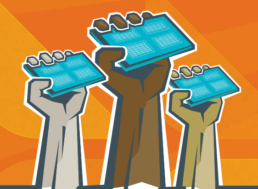Expanding Groundswell’s Community Power Program in Baltimore
Year Complete: 2015
Grant Amount: $50,000
Local Government: City of Baltimore, MD
Local Foundation: Abell Foundation
Project Purpose
To expand Groundswell’s Community Power Program in Baltimore, to help community institutions and low-income families access sustainable power, build connections, and saving money on electricity bills.
Key Lessons Learned
Lessons learned about tools and tactics through the project that other sustainability directors could use to advance their work.
- Invest in on-the-ground organizing staff that dedicates significant time to engaging residents and organizations. By building partnerships with neighborhood associations and government and community groups, you will reach more residents with better results.
- Listening sessions with priority communities are instrumental in guiding an approach to program design.
- Be clear about project roles.
- Develop strong coordination with partners. There are a limited number of institutions in a city and their leaders have limited bandwidth to engage with the broad spectrum of clean energy issues.
- Use texting tools to organize low-income communities who do not have consistent access to computers.
- Take a block-by-block or neighborhood-saturation approach to organizing work.
Lessons for developing a collaborative process between a local government sustainability director and local place-based foundation(s).
Be sure to forge close relationships with local foundations by understanding issues or potential projects that are important to them. There is no telling what new initiatives might emerge.
Additional Information and Resources
The partnership between the Abell Foundation and Groundswell has continued. In May 2014, an additional $50,000 was awarded to focus efforts on new markets in Baltimore. Specifically, these funds were focused on small business and charter school outreach, continuing the block-by-block saturation strategy, hiring a program coordinator and summer fellows, and introducing additional mobile enrollment technologies. In 2016, an additional $60,000 was awarded in support of the initiative Pioneering a New and Replicable Model for Low‑ and Moderate‑Income Community Solar Projects in Baltimore City.

